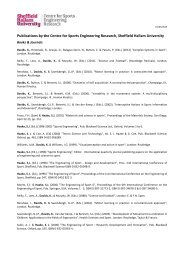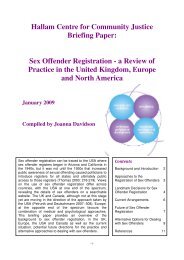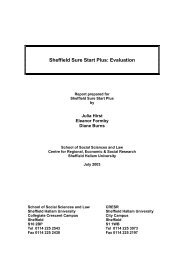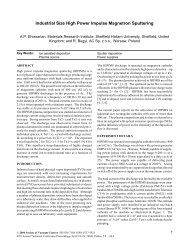The exercise of judicial discretion in rent arrears cases - Sheffield ...
The exercise of judicial discretion in rent arrears cases - Sheffield ...
The exercise of judicial discretion in rent arrears cases - Sheffield ...
You also want an ePaper? Increase the reach of your titles
YUMPU automatically turns print PDFs into web optimized ePapers that Google loves.
Qualitative and quantitative data from London court<br />
Chart 6 below shows the way <strong>in</strong> which the outcomes <strong>of</strong> the <strong>cases</strong> (already presented <strong>in</strong><br />
Chart 2 above) were distributed by district judge (who have been given numbers for this<br />
purpose). <strong>The</strong>se demonstrate some variation, although the number <strong>of</strong> actual <strong>cases</strong> heard by<br />
some judges are small and the chart should, therefore, be viewed with some caution. For<br />
example, <strong>in</strong> the sample <strong>of</strong> <strong>cases</strong> observed, deputy district judge (DDJ) 4 granted no outright<br />
possession orders <strong>in</strong> the sample <strong>of</strong> 29 <strong>cases</strong> observed, and DDJ 7 made a possession order<br />
<strong>in</strong> four <strong>cases</strong> out <strong>of</strong> a sample <strong>of</strong> 23 <strong>cases</strong> observed.<br />
<strong>The</strong>re were also variations on grant<strong>in</strong>g adjournments which, <strong>in</strong> some <strong>cases</strong>, are marked:<br />
DDJ 7 granted an adjournment <strong>in</strong> 16 <strong>cases</strong> out <strong>of</strong> 23 <strong>cases</strong> observed (70%); whereas DDJ 8<br />
granted adjournments <strong>in</strong> eight <strong>cases</strong> out <strong>of</strong> a total <strong>of</strong> 26 <strong>cases</strong> observed (31%); on the other<br />
hand, district judge (DJ) 5 granted 44 adjournments out <strong>of</strong> 53 <strong>cases</strong> observed (83%); DJ 1<br />
granted 29 adjournments out <strong>of</strong> a sample <strong>of</strong> 41 <strong>cases</strong> observed (74%); and DJ 6 granted 35<br />
adjournments out <strong>of</strong> 49 <strong>cases</strong> observed (71%).<br />
Chart 6: Orders Granted by London DJs<br />
100%<br />
90%<br />
80%<br />
70%<br />
60%<br />
50%<br />
40%<br />
30%<br />
20%<br />
10%<br />
0%<br />
Total<br />
DJ 1<br />
DJ 2<br />
DJ 3<br />
DDJ4<br />
DJ 5<br />
DJ 6<br />
DDJ7<br />
DDJ8<br />
34<br />
Other<br />
Adjournment<br />
SPO<br />
Outright<br />
It is also strik<strong>in</strong>g how the diffe<strong>rent</strong> district judges responded to requests made by landlords.<br />
For example, DDJ 4 and DDJ7 both always granted the order requested by the claimant.<br />
<strong>The</strong> distribution for the other judges is more varied where an outright order or a suspended<br />
order was requested. For example, DJ 1 granted a suspended possession order <strong>in</strong> six<br />
<strong>cases</strong> out <strong>of</strong> the 15 requested (40%) and DJ 2 <strong>in</strong> seven out <strong>of</strong> the 12 requested (58%). It<br />
was suggested <strong>in</strong> the focus groups that there was a tendency for deputy district judges to be<br />
harder on defendants, which is not totally borne out by this limited sample.
















